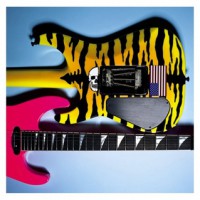How do synth-punk duo Sleigh Bells get their creative juices flowing? My bet was driving around New York jamming out '80s hard rock and making fun of passersby. As it was, I was wrong; turns out they like to â wait for it â box. "Boxing has become a really regular part of our routine," singer Alexis Krauss said, regarding the recording process for their third full-length album, Bitter Rivals. "When you come off of that natural adrenaline high and go into the studio, you're in a frame of mind that is really conducive to making music that's generally more anthemic, and up, and has a lot more energy and go." While Sleigh Bells' trademark sound â buzzsaw guitars, blaring electro synths and 808 drums â has always been the kind of high-octane, deafening anthems of the young and restless, it reaches new heights on Bitter Rivals, an album so entrenched in the conflict motif that its title isn't just a name â it's an announcement.
Wasting no time, Sleigh Bells set the tone with the title track and archetypal lead single, a head-banging jumper showcasing their core elements: overdriven guitar, penetrating synth, and layered vocals over a sparse, heavy beat. If Sleigh Bells had a theme song, it would be "Bitter Rivals" â an unabashed tune purporting their "us vs. them" ethos so effectively through mind and body that it renders the companion music video ostensibly redundant. The self-directed video sees Krauss shadowboxing in a leopard-print robe (with the words "Bitter Rivals" inscribed on it), often in front of her gang of backing girls, and producer Derek Miller's tough guy look sans sunglasses: an LSU football jersey complimenting his tiger-themed guitar. Despite the poorly veiled double (and triple) entendre, the images promote what we already know: Sleigh Bells are badasses, and if you aren't with them, then you're against them. "I had to kill the new sheriff in town/ she was gonna try to keep me down," Krauss sings, before reminding us, "But at the end I can only be/ no rhyme, no reason/ be not afraid."
By this point, abandoning justification to explain Sleigh Bells' intrepidity actually makes sense. Like that of a hormonal teenager, their identity is warped by narcissism and violence, and they employ familiar symbols and tropes to help explicate their often abstract message. The sounds (hardcore guitars, rapid-fire drum beats, frantic screams), words (flippant insults, sports themes) and visuals (cheerleaders, bloody sneakers) construct a framework for understanding who Sleigh Bells are: caustic, chaotic, confident. Bitter Rivals continue to rely on these, but with a refreshing level of self-awareness and applied wisdom. They recognize and accept mortality (both real and perceived) without delusions of grandeur ("Young Legends"). They know when to speak up, shut up, or give up ("Tiger Kit"). They've learned how to forgive ("You Don't Get Me Twice"), knowing it doesn't necessitate they must forget ("Love Sick"). In short, there is a latent coming-of-age quality underlying Bitter Rivals' abrasive, tough pretense. For example, posited metaphorically, the title track is an examination of the internal utilitarian maturation struggle to acquiesce clarity; "You are my bitter rival/ but I need you for survival."
Musically, it follows an analogous narrative. The songs never deviate too far from Miller's penchant for pop simplicity, built on loud guitars and punctured synths. Sleigh Bells' sound is evolving, though. For instance, Miller incorporates acoustic guitar on a few tracks, often with a blown out effect ("Bitter Rivals," "Young Legends"). For her part, Krauss expands her palate, experimenting with new vocal harmonies and patterns. The end result is a strong R&B character to accompany her signature sass, and for the first time establishing her voice â and not her scream â as a prominent sound. "To Hell With You" thrives in part due to this new approach, while the chorus to the '80s new wave-inspired "Love Sick" is so sexy it indemnifies Krauss' bitter resentment. Collectively, these minor aberrations by Miller and Krauss create a more dynamic, and â if you can imagine â louder sound.
Not to mention, friendlier. Because despite the recent surge in popularity of co-ed electronic duos, Sleigh Bells are still one scream too punk for the radio. But maybe not anymore. And if their recent appearance on Jimmy Kimmel is any indication, Bitter Rivals may be the knock out that separates them from the rest of their scrub contemporaries.
